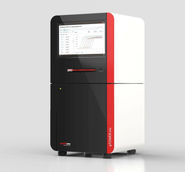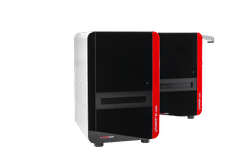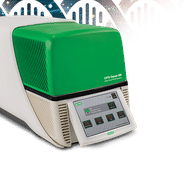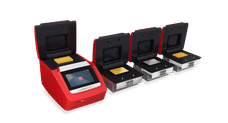Rapid PCR tests at the touch of a button
ETH start-up diaxxo hope to fundamentally change the way in which PCR testing is deployed in medicine
ETH researchers Michele Gregorini and Philippe Bechtold have developed a PCR testing device that can easily be used outside the lab – and that takes less than 30 minutes to deliver results. Now the two young entrepreneurs are focusing their efforts on getting the device approved for medical use.
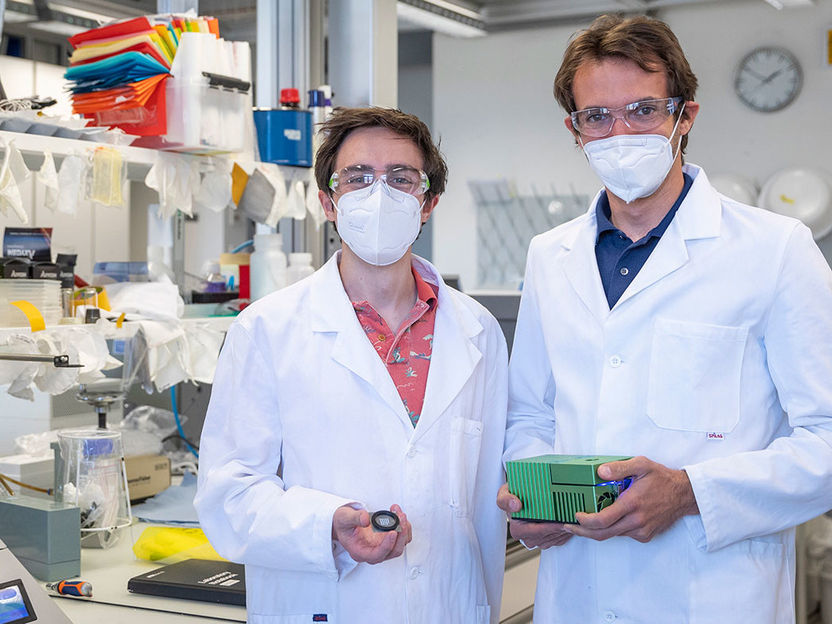
Philippe Bechtold (left) and Michele Gregorini are much less often in the laboratory since they have founded their own company.
Alessandro Della Bella/ETH Zürich
When Michele Gregorini applied for his doctoral project five years ago, he found himself in the same office in which we’re chatting to him today. Sitting across from him was Wendelin Stark, a professor in the Department of Chemistry and Applied Biosciences. Stark suggested that the 26-year-old Gregorini, a mechanical engineer from Milan, should develop a PCR testing device that was quicker and easier to use than conventional models.
The memories of that day are still imprinted on Gregorini’s mind. “At that point, I didn’t even know what PCR stood for – let alone how the method worked!” he says with a smile. It was early 2016, and he had just returned from Australia where he had spent a year working for a solar energy start-up after completing his studies at ETH Zurich.
Today, Gregorini is the CEO of his own recently established company – and the PCR device he developed in his doctoral project is their hallmark product. It’s been almost a year since he founded the ETH start-up diaxxo together with Philippe Bechtold, a 26-year-old chemical engineer from Luxembourg who also joined Stark’s research group to do his doctorate, which is now in its final stages.
But the two young entrepreneurs aim to do more than just launch a new medical device – they also hope to fundamentally change the way in which PCR testing is deployed in medicine.
A PCR test for just a few Swiss francs
PCR tests have long been the gold standard for diagnosing infectious diseases, even before the coronavirus pandemic. In order to determine the exact pathogen responsible for a respiratory infection, a doctor takes a throat swab and sends the sample to a medical lab for analysis. It typically takes several days to get the results back, at which point they can confirm whether the patient is suffering from flu, pneumonia or a simple cold.
Gregorini and Bechtold were determined to make this process easier and, above all, quicker. They envision a future where healthcare staff will be able to perform PCR tests right at the point of care – and get results in less than 30 minutes. This would enable patients to get the treatment they need at their very first appointment.
“It would save so much time and be a whole lot cheaper,” Gregorini says. Their goal is for the test to cost only a few Swiss francs. Bechtold adds that this would finally open the door to PCR testing in developing countries, which often lack the funding to perform laboratory analyses.
Test cartridge the size of a coffee pod
The start-up founders have been working on their PCR device for the past five years. They developed every aspect of the first prototype themselves, from the housing and electronics to the software and the replaceable test cartridge in which the biochemical reaction takes place. This cartridge is similar in size and shape to a coffee pod, and it’s the most significant innovation of the new device.
Instead of the conventional method of mixing the PCR reagents in a plastic tube, diaxxo’s solution works by simply pipetting a droplet of the patient’s sample straight into one of the wells in the aluminium cartridge. Since metal conducts heat much better than plastic, the new device can heat and cool the reagents considerably faster than conventional devices.
This is important, because replicating the pathogen’s genetic material relies on reaction cycles consisting of multiple steps that are carried out at different temperatures ranging from 55 to 95 degrees Celsius. Performing one of these cycles takes just under 20 seconds in the new device, as opposed to two and a half minutes in a conventional device. This reduces the time required for a 45-cycle PCR test from over two hours to just under 20 minutes, which is similar to the time it takes to perform a rapid antigen test.
The new device also eliminates the need to painstakingly pipette multiple PCR reagents into a sample container. Instead, diaxxo’s solution is to deliver the reagents as part of the package – freeze-dried and deposited in the bottom of each well. This also has the advantage of enabling test kits for different pathogens to be stored at room temperature for up to six months.
Pandemic gives the project a boost
Gregorini and Bechtold encountered plenty of challenges when it came to developing a reliable method. Bechtold spent a long time perfecting a drying process for the reagents that ensures they mix properly with the sample when the time comes. “That was one of the toughest tasks of all,” he says, recalling how difficult it was to get the reagents attached firmly enough in the wells for the cartridges to be transported safely.
But the biggest turning point of all came in spring 2020 with the emergence of the coronavirus pandemic. “All of a sudden, there was this huge demand for the medical device at the heart of our research project,” Gregorini says. Even before the virus had fully arrived in Switzerland, the engineers began developing a cartridge to detect SARS-Cov-2 – their first ever diagnostic test.
From there, things just snowballed. The two researchers obtained their first grant from the Swiss National Science Foundation’s “Bridge” programme, swiftly followed by coronavirus funding from various other sources. In September 2020, Gregorini and Bechtold were accepted into the ETH Pioneer Fellowship programme; in October, they founded their company, diaxxo.
From developers to managers
Today, diaxxo employs 12 people as part of a growing team of hardware and software specialists, biotechnologists and electrical engineers. Together, they are steadily improving the PCR device to make it ready for the market.
At the same time, the focus of the two founders has shifted away from product development as they gradually slip into more of a managerial role. They now spend most of their time answering questions from the team, preparing presentations for potential backers and communicating with project partners by email. It’s not until the early evening, when most of his colleagues have already gone home, that Gregorini finally finds time to check out how things are progressing in their workshop at ETH.
Field study in Zanzibar provides important inputs
Meanwhile, the list of potential customers just keeps on growing. New enquiries are arriving by the day – including interest from a major cruise line. But with the device currently still pending approval as a medical device, the company founders are not permitted to sell their products to private customers and must instead rely on research collaborations. These joint projects offer the perfect channel for improving the device’s suitability for everyday use.
diaxxo’s project with the Swiss Tropical and Public Health Institute (Swiss TPH) is the biggest collaboration the start-up has embarked on so far. It involves a field study in Zanzibar, where diaxxo devices are currently being used to test schoolchildren across the country for schistosomiasis, a disease caused by parasitic worms.
Swiss TPH’s partners are particularly enthusiastic about the new PCR device because it allows them to carry out on-site testing in schools. Gregorini and Bechtold are available around the clock to support researchers in using the device, and they have already helped improvise everything from software updates to local repair manuals.
This ever-changing environment is one of the things that Bechtold loves about his job: “Every day is another amazing learning opportunity.” At the same time, however, the two founders are aware that diaxxo might have a limited lifespan. “It is very challenging for a small company on its own in the medical device sector to build up a big enough range of products to become profitable,” Gregorini says.
One scenario is that diaxxo will be acquired by a larger company sometime in the next few years. But, for the time being, the two founders are determined to put all they can into the business and see how far they can take it.
These products might interest you
Something is happening in the life science industry ...
This is what true pioneering spirit looks like: Plenty of innovative start-ups are bringing fresh ideas, lifeblood and entrepreneurial spirit to change tomorrow's world for the better. Immerse yourself in the world of these young companies and take the opportunity to get in touch with the founders.
See the theme worlds for related content
Topic World PCR
This groundbreaking and highly versatile molecular technique of PCR allows us to amplify tiny amounts of genetic material on a large scale and analyze them in detail. Whether in medical diagnostics, forensic DNA analysis or research into genetic diseases - PCR is an indispensable tool that gives us deep insights into the world of DNA. Immerse yourself in the fascinating world of the polymerase chain reaction (PCR)!

Topic World PCR
This groundbreaking and highly versatile molecular technique of PCR allows us to amplify tiny amounts of genetic material on a large scale and analyze them in detail. Whether in medical diagnostics, forensic DNA analysis or research into genetic diseases - PCR is an indispensable tool that gives us deep insights into the world of DNA. Immerse yourself in the fascinating world of the polymerase chain reaction (PCR)!






















